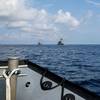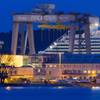President Clinton's budget transmitted to Congress includes $4.06 billion for the USACE Civil Works program. In addition, the program will include $322 million in non-federal contributions and trust fund receipts.
Funding in this request will be used to continue the development of the nation's water resources, the efficient operations, maintenance and management of the nation's navigation, flood damage reduction, and multiple-purpose projects, the equitable regulation of wetlands, and the restoration of important environmental resources such as the South Florida Ecosystem. The budget also begins to address some of the Corp's long-term water resources infrastructure main-tenance requirements.
The budget includes a proposal to establish a Harbor Services User Fee and Harbor Services Fund (HSF). Under this proposal, fees would be charged to vessels transiting the harbors of the U.S. These receipts would be placed in the HSF and would be available the following fiscal year for appropriation to fund both construction and operation and maintenance of the nation's channels and harbors.
The existing Harbor Maintenance Tax and Harbor Maintenance Trust Fund would be repealed, and the remaining balance of the Harbor Maintenance Trust Fund would be deposited in the new HSF. The budget proposes to appropriate $950 million from the fund in FY 01, with $250 million applied to port improvement construction and $700 million to fund operation and maintenance requirements.
"This budget request is one of the largest we have received and is a good first step in re-capitalizing the nation's water resources infrastructure," Lt. Gen. Joe N. Ballard, Chief of Engineers for the USACE said. "We need to reinvest in this infrastructure to support continued national economic growth and this budget includes several initiatives that put us on the right course."
The budget breakdown includes $137.7 million for general investigation (funds studies, design, coordination, data collection and research and development); $1.4 billion for general construction (funds project construction and major rehabilitation); $1.9 billion for general operation and maintenance (funds the running and upkeep of existing projects, which include hydropower facilities, locks and dams, recreation areas and navigable waterways); $125 million for regulatory program (funds the USACE's permit program for dredge and fill material in the waters of the U.S., partially offset by $7 million from permit fees which is dependent upon enactment of proposed legislation); $309 million for flood control, Mississippi River and Tributaries (funds the study, design construction, operation and maintenance for water resources projects in the alluvial valley of the Mississippi River); $152 million for general expenses (funds for the executive direction and management of the Corps of Engineers Headquarters and major subordinate commands such as divisions); and $140 million for the Formerly Utilized Sites Remedial Action Program (FUSRAP) (funds for the management of the program transferred to the Corps from the Department of Energy by the Energy and Water Appropriations Act, 1998).
Organizations Shoot Down Budget with HSF
The Administration's FY 01 budget request for the USACE' Civil Works program calls for nearly $1 billion in new taxes on the maritime industry to fund a Harbor Services Fund (HSF). The Administration has proposed a replacement for the Harbor Maintenance Tax, which the U.S. Supreme Court declared unconstitutional in March 1998, with a new tax on commercial vessels that use federal navigation channels in U.S. harbors.
A variety of maritime organizations reacted strongly to inclusion of the HSF, for the second year in a row, in the Administration's budget proposal. The HSF is included in FY 01 budget request of $4.06 billion. It compares to $4.15 billion in FY 00 appropriated levels.
Although federal budget surpluses are projected to be larger than at any time in recent history, the Clinton Administration, in April 1999, proposed the new tax in the Harbor Services Fund Act of 1999, H.R. 1947. It is purported to address the Supreme Court decision as well as an HMT challenge brought by the European Union (EU). However, last August the EU responded the HSF would still constitute an unfair trade practice. Also in April, 1999, Congressmen Oberstar (D-Minn) and Borski (D-Pa.) introduced H.R. 1260, which would repeal the HMT and return to funding the federal share of operating and maintaining federal navigation channels from general revenues (since ports benefit the entire nation).
The new tax on vessels places the entire financial burden of navigation channel maintenance, as well as improvements, on certain commercial traffic. The HSF plan could have the effect of pricing U.S. commodity exports, such as grain and coal, out of international markets.
"It's incredible to the entire maritime community that despite the uniform opposition to H.R. 1947, the HSF bill, the Administration put it right back into the 2001 budget proposal," said Kurt J. Nagle, president, American Association of Port Authorities. "With a surplus of more than $2 billion in the Harbor Maintenance Trust Fund, and projected budget surpluses, the HSF proposal would create a new tax to raise nearly twice what is needed for maintenance dredging. The Federal Government continues to suggest that it completely abdicate its financial responsibility for federal navigation channel maintenance."
"The Transportation Institute continues to oppose the Administration's proposal to replace the Harbor Maintenance Tax with a new tax on vessel operators," said Peter Friedmann, executive director, Transportation Institute. "In renewing its proposal in the FY 01 budget request to establish the Harbor Services Fund, the Administration clearly has failed to listen to the concerns of marine transportation, the ports, shippers, and commodity interests. We continue to urge the Congress to weigh the concerns of these vital industries, to recognize the importance of a well-maintained waterway system to the economy and national security, and to support sound legislation such as H.R. 1260, which will fund port and waterway projects out of the general treasury."
"The American Waterways Operators (AWO) is extremely disappointed the Administration has again completely abdicated the historic responsibility of the federal government to maintain and improve America's ports - ports that benefit the entire nation's economy," said Thomas A. Allegretti, president, AWO. "The tugboat, towboat and barge industry strongly supports the legislation sponsored by Congressmen Oberstar and Borski to repeal the existing Harbor Maintenance Tax and again authorize general revenues to pay for the federal cost of operating and maintaining the nation's harbors."
"The Administration's proposal to shift the entire cost of constructing and maintaining deep-draft harbor channels to the private sector is tantamount to a denial coastal and Great Lakes ports contribute to national economic well-being, generate Federal tax revenues, or, in fact, have public value," said Harry N. Cook, president, National Waterways Conference. "Exactly the opposite is true, which is why it makes good sense for the U.S. Treasury to invest in navigation infrastructure."
Subscribe for
Maritime Reporter E-News
Maritime Reporter E-News is the maritime industry's largest circulation and most authoritative ENews Service, delivered to your Email five times per week









